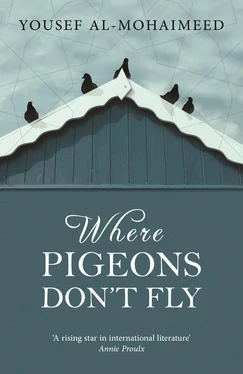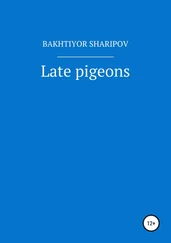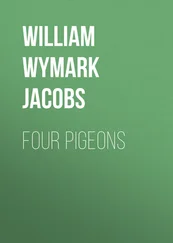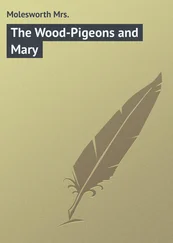Bit by bit he started to bring his possessions over to Saeed’s rented flat, and when Saeed urged him to stay by the side of his mother and sister, Fahd told him he would go somewhere else if he didn’t want to have him as a guest. So Saeed let him have his way until the day came that Fahd told his mother: ‘I hate you, and I hate your damned husband. I even hate this house now: it’s got no soul now my Dad’s gone.’
‘My husband is your uncle, like it or not,’ she replied. ‘No angel will enter the house if there’s a dog or a picture in it, and anyway … we don’t need pictures to remind us of anything.’
He picked up a new sketchbook that he had left behind. ‘Fine, so if he rips up the photos the angels will troop in, will they?
As he scuttled down the steps like a wolf, he added, ‘And shouldn’t the dog leave the house before the pictures?’
Part 3. Love, fear and darkness
Starve me,
So that I become a lioness of discontent in the wildness of the night thickets,
So that I tease your bulging hide with my tooth’s keen edge.
Akl Awit, The Freeing of the Dead
— 19 —
APPROACHING BISHOP’S STORTFORD THE train slowed. A few people got aboard and passed by the ticket inspector with his small handheld device that stamped the day and date on the tickets of new passengers. The old lady offered Fahd a piece of gum. He took it and thanked her. His mind was a little calmer. He looked through the window at the empty wooden seats on the platform and the policeman who stood holding a big dog on a lead.
The train set off and Fahd’s memories galloped in its wake, wild and panting. He was thinking that it was no easy matter to rebel and to take risks with your life but if you didn’t do it when you were a teenager or a young man then you never would. That is how it had been with him: there had been nothing worth fighting for, nothing worth preserving. He hadn’t rebelled like his father. He hadn’t done what Suleiman had done and clashed with government and society. His father would have taken up arms, had he not slowly withdrawn, using Imam Turki’s mosque as a way to escape the Salafist Group, going to listen to the blind sheikh’s speeches and sermons at sunset prayers every day until he dropped out of the reckoning altogether.
Fahd’s decision to leave the family home forever was painful and devastating. Even if initially it was not on a permanent basis — spending first one night away then two, then more — it still saddened his ailing mother. What would she do at night? Would Lulua wash her forehead using water infused with the saffron ink from Qur’anic verses inscribed on white paper? Would she take three small gulps then rest her bandaged head on the pillow in search of sleep? Would she take a sleeping pill in order to drift off like the dead?
Fahd and Saeed had gone out together many times, loafing around Tahliya Street and Faisaliya Tower and pursuing the frisky girls who drew their admirers after them like panting dogs. They chased their lusts in a trance, like children chasing brightly coloured birds or butterflies, bewitched by a beguiling glance from behind a niqab , by eyes painted with kohl and maddening eye-shadow, by laughter, by shoulders jostling as the girls swayed, lascivious and lustful, and pointed mischievously towards the two young men.
Saeed become another person when girls teased him. Whenever he got the chance or came across some sheltered spot he would almost rub up against their abaya -clad bodies. He was indifferent to the presence of Indian and Filipino vendors and tried to avoid the looks of Arab street sellers — the Lebanese, Syrians and Egyptians — but when he caught sight of a Saudi walking behind his wife he would keep his lunacy completely under wraps. Alone with a girl, however, he would become demented and reckless.
One night he surged forward like a tiger towards two juicy morsels standing by the elevator and giggling in his direction and took them both in his arms. One of them hit him on the head with her handbag and he came back over to Fahd out of breath and laughing. ‘That bitch. She’s the one who gave me her number.’
Fahd could never match his wildness. He would follow after a girl full of trepidation but if she so much as glanced at him he would retrace his steps, stumbling like a bunny rabbit.
‘Your problem is that you take life seriously, even though it’s not worth it,’ Saeed would always tell him. The truly incredible thing was that Saeed’s extensive culture and learning could coexist with this demented pursuit of lust. When Fahd questioned him about the contradiction he’d laugh. ‘There’s no contradiction: it’s all culture.’
One girl, Noha, was exceptional but Fahd was not in love with her. For her to leave the house meant mobilising the ‘Armies of Christendom’ as he put it; she was unable to go out without being accompanied by her entire family, and so he steered clear, until he discovered some comfort for his own misfortunes in her voice and past. She started calling him every day on the landline in the flat (the ‘den’ as Saeed called it) then got hold of his mobile number.
One day she left home in the company of the horde, all their vast baggage and retinue in tow, and arranged to meet Fahd at Mamlaka Tower in the afternoon. He stood staring nervously at the Rabei flower shop until she appeared before him and, flustered, shook his hand. Fahd grew increasingly disconcerted as she closed her eyes behind the niqab and trembled like a madwoman. He left her after a few minutes. Later, she confessed that she had nearly taken him in her arms: ‘I just love your eyes! she said, then added, ‘Not to mention your golden moustache.’
He chuckled. ‘Golden, or ginger?’
Saeed always said that the girl who wouldn’t go out with you after the second phone call wasn’t worth your time. ‘Love is business, my friend,’ he would say, before delivering his famous line: ‘Do you think a businessman would put all his capital into a project that wouldn’t turn a profit for a whole month?’
‘Of course not,’ Fahd would laugh.
Profit, in Saeed’s eyes, meant holding a hand, giving it a squeeze (sometimes a kiss), a playful slap on the buttocks, a breathless embrace, a deep, long kiss and so on. To call moans and heavy breathing down a phone line ‘profit’ was ridiculous, hardly worth the effort. Why? Because watching porn and doing the job yourself was a sight better than the self-deception of bringing yourself off to a panting, moaning voice.
Fahd didn’t answer the missed calls from his mother and sister but, lifting the receiver of the phone in the flat, he was startled to hear his mother weeping and reproaching him for ignoring them. He gave a deep, tragic sigh and said harshly, ‘It was you who decided where your interests lay. Everything my uncle did was designed to get me thrown out, and you just tried to keep him happy. Perhaps he wasn’t the only one who wanted me out of the house!’
Through her tears she said, ‘You should be ashamed of yourself, Fahd! I’m still your mother and Lulua’s your sister.’
She wouldn’t hang up until she had persuaded him to come round on those days when his uncle was away, especially now that her illness had become of serious concern. She said, ‘No one knows how long they’ve got, my son.’
It pricked his conscience and he made up his mind to stop by on the nights when his uncle was sleeping with his other wives. They settled into their routine. Sometimes his mother would beg him to stay the night and despite the appeal of life in the ‘den’ he would agree. Everything that was outlawed and forbidden in his uncle’s kingdom was freely available in Saeed’s lair. In Ulaya, there were no satellite channels, no glossy magazines or daily papers, no pictures, music or songs, no computer and no Internet; in the flat, there was all that and more.
Читать дальше












